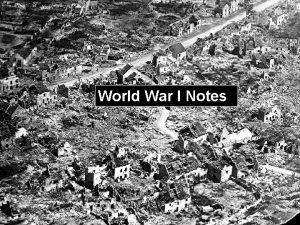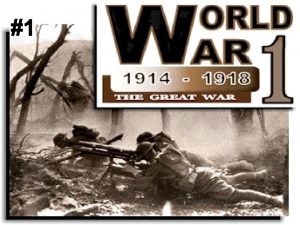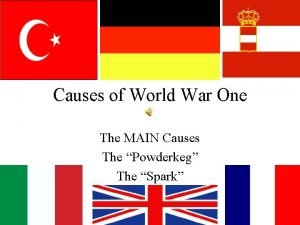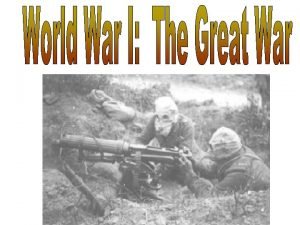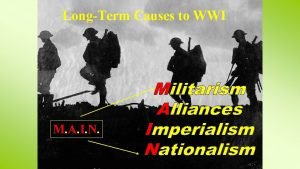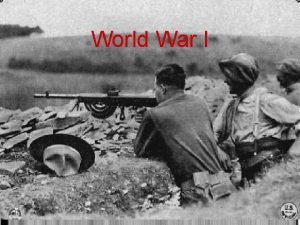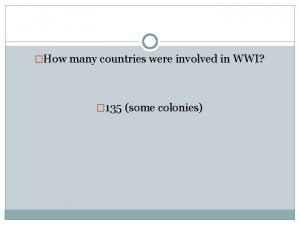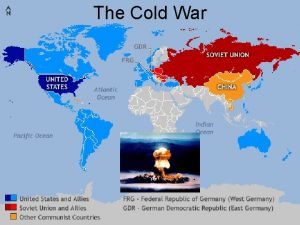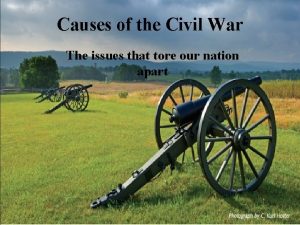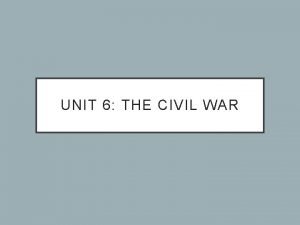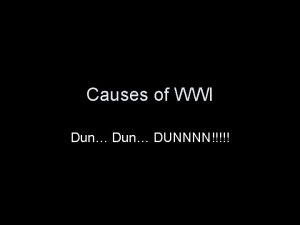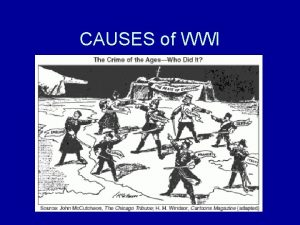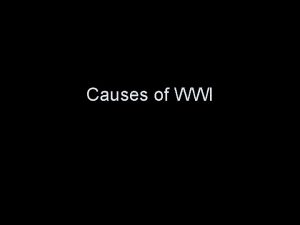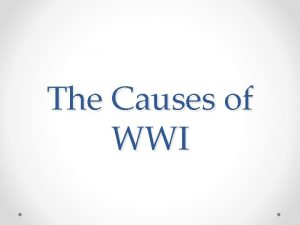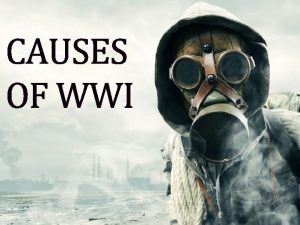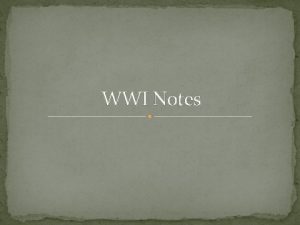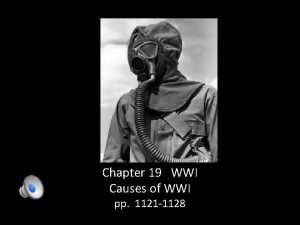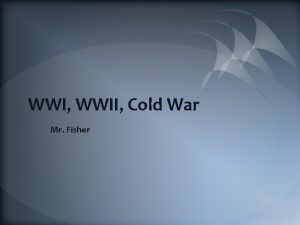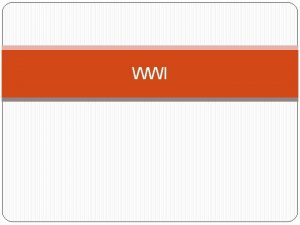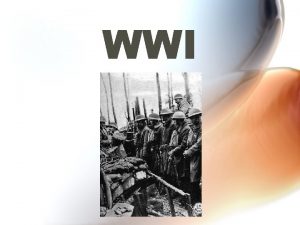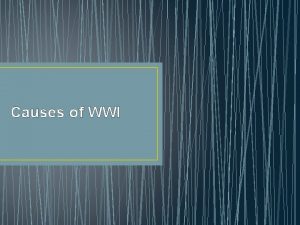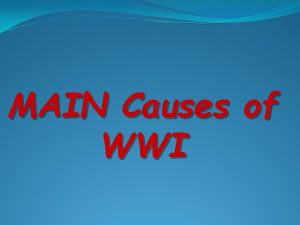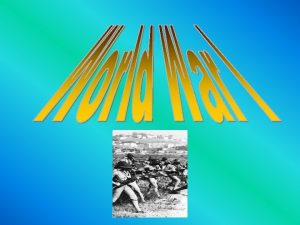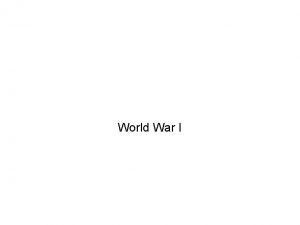What Were the Causes of WWI Nationalism Nationalism
























- Slides: 24


What Were the Causes of WWI? • Nationalism- Nationalism or extreme devotion to one’s nation or people, sometimes led to hostility toward other nations. • Imperialism- European imperial powers competed to extend their empires by seizing territory to add to their colonies in Africa and Asia. • Militarism- For Decades, European countries had been building up military power and adopting warlike attitudes. • Alliances- In a complex system of alliances, many European countries had agreed to defend one another from attack. These alliances pulled nations into the war.

The spark that lit the fuse…. • The one event that started the Great War happened was the assassination of Archduke Franz Ferdinand • The Archduke Franz Ferdinand was in line to become the king of Austria-Hungary.

Causes of World War I - Assassination Archduke Franz Ferdinand Duchess Sophie Sarajevo, Bosnia - June 28 th, 1914.

Causes of World War I - Assassination Austrian Archduke Franz Ferdinand was killed in Bosnia by a Serbian nationalist who believed that Bosnia should belong to Serbia.

Causes of World War I Assassination Gavrilo Princip after his assassination of Austrian Archduke Franz Ferdinand.


A War of Movement? • The Great War- a phrase coined even before the war began- was expected to be relatively short and one of great movement like other wars. The war started in the autumn of 1914. After the Archduke of Austria-Hungary was assassinated and the alliances kicked in, Germany swept through Belgium en route to France. When the French started pushing the Germans back, the Germans dug trenches to hold ground.


Allied Powers: Central Powers: Germany Great Britain France Austria-Hungary World War I Russia Italy Ottoman Empire

Figure 31. 1: Approximate Comparative Losses in World War I

The Trench System • The front line trenches were usually 7 feet deep and about 6 feet wide. The allies usually had to dig their trenches in lower ground so they were often waterlogged. They were built in a zigzag pattern to prevent the enemy from shooting straight down the line. Sandbags were put on top to absorb enemy bullets. The fire step was cut into the side of the trench. It was where the sentries stood or the whole unit would stand while waiting for an attack from the enemy.


#11 Trench Foot World War I In 1993, Terry Cunningham interviewed Arthur Savage, 92, about his memories of the World War I, excerpted as follows: 'My memories are of sheer terror and the horror of seeing men sobbing because they had trench foot that had turned gangreen. They knew they were going to lose a leg. Memories of lice in your clothing driving you crazy. Filth and lack of privacy. And cold deep wet mud everywhere. And of course, corpses. I'd never seen a dead body before I went to war. But in the trenches the dead are lying all around you. '

#12 Trench Foot Many soldiers fighting in the First World War suffered from trench foot. This was caused by your feet being constantly wet and damp. If untreated, trench foot could turn gangrenous and result in amputation. In the Trenches men stood for hours on end up to their ankles in mud. The symptoms were feet gradually go numb and the skin would turn blue or red. The only remedy for trench foot was for the soldiers to dry their feet and change their socks several times a day. By the end of 1915 British soldiers in the trenches had to have three pairs of socks with them and were under orders to change their socks at least twice a day. As well as drying their feet, soldiers were told to cover their feet with a grease made from whale-oil. It has been estimated that a battalion at the front would use ten gallons of whale-oil every day!

#13 Trench Rats In the trenches there was no time for burial so hundreds of bodies stuck half buried in the mud. The smell of rotting flesh hung heavy in the air and as well as scraps of food left around the trenches this attracted Rats! One pair of rats could produce 880 offspring in a year so soon the trenches where full of them. Most of the Rats grew extremely large and could eat a man alive if he couldn't defend himself. On one body at least three rats where found; normally the victims eyes had been eaten first and then the rats ate the rest of the body from there.

Daily Death in the Trenches l Death was a constant companion in the front line trenches. In busy sectors, shellfire was constant and many men were buried as a consequence. Many men died on their first day because their natural inclination was to peer over the top into No Man’s Land. It is estimated that over 1/3 of all the deaths during WWI actually occurred in the trenches.

Daily Boredom! l Given that each side’s front line was constantly under watch by snipers and look-outs during the daylight, movement was logically restricted until night fell. Thus, once men concluded their assigned task, they were free to write letters home or read. Sleep was snatched wherever possible- though it was seldom that men were allowed more than a few minutes before assigned a new task.



Patrolling No Man’s Land l The land between the Allied Powers trench and the Central Powers trench was called No Man’s Land was a wasteland of craters and barbed wire. Patrols would often be sent out into No Man’s Land to repair the barbed wire or others would sneak out at night and listen to the enemy in hopes of gaining important information. Sometimes whole troops went, “Over the Top” to attack the enemy lines, but this was rarely successful.

Oh the snow flakes fell in silence Over Belleau Wood that night For a Christmas truce had been declared By both sides of the fight As we laid there in our trenches The silence broke in two By a German soldier singing A song that we all knew Though I did not know the language The song was Silent Night Then I heard my buddy whisper "All is calm, all is bright" Then the fear and doubt surrounded me Cause I'd die if I was wrong But I stood up in my trench And I began to sing along Then across the frozen battlefield Another's voice joined in Until one by one each man became A singer of the hymn Then I thought I was dreaming For right there in my sight Stood the German soldier Neath the falling flakes of white And he raised his hand smiled at me As if seemed to say Here's hoping we both live to see Us find a better way Then the devils clock struck midnight And the skies lit up again And the battlefield where heaven stood Was blown to heck again But for just one fleeting moment The answer seemed so clear Heaven's not beyond the clouds Its just beyond the fear No heaven's not beyond the clouds It's for us to find here

Over the Top

Letter Home l You are an European soldier fighting in the trenches during World War I. You are told by your commander that you are going “Over The Top” tomorrow. Write a letter home telling your family about the conditions you are facing in the trenches (use facts from the article and powerpoint) and explain to them that you are going “Over The Top”. Share your feeling about your experience in the letter.
 Causes of world war 1 mania
Causes of world war 1 mania What were the 4 main causes of wwi
What were the 4 main causes of wwi Simulateries
Simulateries What were the main reasons for ww1
What were the main reasons for ww1 Nationalism wwi
Nationalism wwi Mania acronym for causes of wwi
Mania acronym for causes of wwi Main long term & immediate causes of wwi
Main long term & immediate causes of wwi 4 causes of ww1
4 causes of ww1 The 4 causes of ww1
The 4 causes of ww1 Main causes of ww1
Main causes of ww1 How many countries were involved in wwi
How many countries were involved in wwi Is great britain a country
Is great britain a country Were critics of wwi anti-american
Were critics of wwi anti-american Proximate causes of behavior
Proximate causes of behavior Ultimate vs proximate causation
Ultimate vs proximate causation What were the causes and effects of the vietnam war
What were the causes and effects of the vietnam war Causes of korean war
Causes of korean war Cause of korean war
Cause of korean war What were the 4 main causes of the civil war
What were the 4 main causes of the civil war Persian wars cause
Persian wars cause Cause of colonialism
Cause of colonialism What were the long term causes of the great depression
What were the long term causes of the great depression What were the causes of the mexican revolution
What were the causes of the mexican revolution French for new beginning
French for new beginning Causes of the civil war
Causes of the civil war
